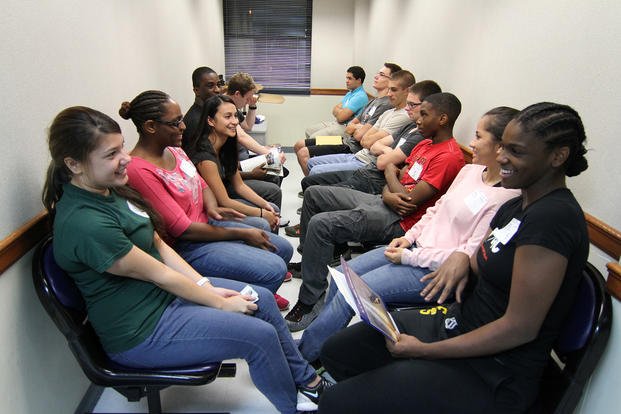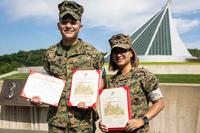From star-studded generals to master chiefs and sergeants major, the Military Entrance Processing Station is the starting point of most military careers.
You've wrestled with the decision for months, or maybe you decided on a whim, but either way, you have made the decision to become a member of the U.S. Armed Forces. You're ready and raring to blast off into the great unknown, aka recruit training.
Not so fast. You can't just wake up one morning and say, "OK, I think I'll go to boot camp today."
Come on, this is the military we're talking about. There's an official process for everything the military does, including becoming an eligible applicant for your choice of service.
Once you've sat down with your recruiter and made the decision to join the military, he or she will set up a date for you to visit the Military Entrance Processing Station (MEPS) for your region. That's when you officially become an "applicant." The military entrance process includes Armed Services Vocational Aptitude Battery (ASVAB) testing, medical examination and background screening.
The recruiter acts as a travel agent for the trip, setting up transportation and lodging. The trip usually lasts about two days, including travel time, depending on your proximity to the station.
What should you bring? Keep your luggage to a bare minimum. One backpack or small duffel bag will suffice. You'll need one change of clothes and an overnight hygiene kit (toothbrush, comb, deodorant, etc.). You'll also need to bring your Social Security card, birth certificate and driver's license. Keep in mind, you will spend most of your day in waiting areas, so bring a magazine or two, but personal stereos and handheld video games are not allowed.
Upon arriving at the hotel, you will check in, drop off any luggage and take a shuttle to the MEPS where ASVAB testing begins at 4 p.m. If you already have taken the ASVAB, you can hang out at the hotel, eat dinner (all meals are provided for you) and get to know some of the other applicants.
For some, this will be their first night away from home; others may be returning to MEPS to ship out for recruit training. For Nina M. Krebs, 21, this is her first night away from her husband, Daniel, and 1-year-old son, Alexander. Krebs plans to join the Air Force and go into the medical field.
"I think it would be so cool to work in labor and delivery. I think pregnancy is beautiful, and if I could help along with the process, that would make me really happy," said the Aransas Pass, Texas, native.
For now, though, her concentration is on getting through the next day successfully. She anxiously tosses and turns all night, getting only a few hours of sleep and rising at 3 a.m. to shower and eat breakfast.
The normal wake-up call for all applicants is 4:10 a.m. It's an early start to a long day, and as Krebs and the other applicants ride the shuttle to the Richmond, Virginia, MEPS, it is hours from daylight.
About 45 applicants stand in a huddle on the steps of the MEPS, waiting for the magic hour of 5:30 a.m. when the doors open and processing begins. Some stand alone, bleary-eyed in the early morning; others talk quietly in groups, already forming friendships. This is the first wait of the day, but it certainly won't be the last.
A Marine sergeant opens the glass doors and the applicants form a line, shuffling through the metal detectors and security inspection.
In a strange sort of follow-the-leader fashion, they find elevators and head up to the seventh floor, where they meet their MEPS liaison and pick up their nametags. Each applicant then checks in with the operations control desk, where they place their luggage in green cubbies, kindergarten style, and head to the medical department.
It is obvious the MEPS staff knows exactly what they are doing. They tell each applicant exactly what to do and everything runs like clockwork.
Once the applicants are seated in a classroom setting, the MEPS medical staff briefs them on how to fill out their medical history forms. Questions are answered, the forms are signed and passed in, and the first of many medical tests is given.
Each applicant takes a Breathalyzer test to detect any alcohol in the applicant's system. Krebs is the first to take the test, no problems so far. She then gives a urine sample. The lab technicians test the urine for drugs, sugar and protein levels, and pregnancy. Applicants also give a blood sample for an HIV test. Some applicants wince at the idea of a needle, but soon discover they had nothing to worry about, just a small pinch and it's over.
At this point, the applicants are sent to various exam rooms. They go through vision and hearing tests, height and weight measurements, blood pressure and pulse checks, and an orthopedic and neurological exam to check their basic physical agility.
The ortho/neuro exam is one of the most talked-about exams. This is when the applicants, dressed in only their undergarments (males and females are separated into different sections of the medical department), perform the infamous "duck-walk" and other exercises such as squats and arm rotations. A doctor inspects each applicant for sound bone structure and coordination. This is also when the doctor checks each applicant's feet for dermatological problems and flatfeet.
"They have you walking around on your knees," Krebs said with a giggle. "Don't they know that's the boniest part of your body? We're all walking around on our bony protrusions, and they're asking us if it hurts. It's not exactly a comfortable feeling.''
All in all, the day hasn't been too bad so far.
"Everything has gone fine," Krebs said. "I've passed all my tests. Up to this point, it's been a cakewalk."
Each applicant then goes into a private setting with a doctor, who does a full medical exam. The doctor also discusses the applicants' medical history, going over anything that might disqualify them. This is where Krebs runs into a problem. With the recent birth of her son, she had some follow-up medical appointments that seemed questionable to the doctor. This discourages Krebs because she really wants to join the Air Force, and now it looks like she may have a change of plans.
"When they call you in to go over your medical history, the doctor said they needed more information about me,'' Krebs said. "I'm really set on doing this. If I don't get to finish, I'll be upset because I've put so much time and effort into this."
She contacts her doctor's office and asks them to fax over some of her medical records. While she waits for the fax, she heads down to lunch.
Sitting at a table with her new friends, Stephanie L. Frey, 17, of Powhatan, Virginia, and Kandy Johns, 20, of Madison Heights, Virginia, Krebs discusses the day's events. The joking and laughter seem to ease some of Krebs' tension and frustration.
"There's nothing to be afraid of at MEPS," she said, "You just make friends and talk to people, then you know you're not alone. We all seem to be in the same age group, and we have a lot in common. I think all the waiting has something to do with making friends easily here."
Back in the medical department, Krebs waits for the doctor's verdict. Will she be able to continue toward her Air Force goals?
Finally, she receives an answer.
"I am ecstatic,'' Krebs said. "Oh, I am so happy. He's sitting there looking at my paperwork and I was really nervous. Then he says, 'Congratulations, you're qualified,' and I said, 'Woo-hoo.'"
With medical conquered, Krebs has one final step, her job interview. This is when the applicants schedule their boot camp dates and find out what jobs are available to them. Each branch of service works differently in the job selection process. Some applicants find it's easier to get the job they want if they choose during recruit training. Another service leaves the job assigning to the applicant's recruiter. Each branch of service works differently, so it's important for applicants to fully understand the job selection process before they get to MEPS.
Once the job interviews are finished, everyone meets at the operations control desk and prepares to swear in. As they pass fellow applicants in the labyrinth of sterile hallways that will never become familiar, the question is always asked, "Are you swearing in?" Sometimes the response is a yes, but often the answer is, "Not today."
The ceremonial room is formal with heavy drapery and flags. The applicants, lucky enough to pass through the intense scrutiny of the MEPS staff, line up in a mini-formation and take their oath of allegiance.
Krebs is relieved at how the day turned out for her.
"That was a satisfying feeling. I completed my objective. I came, I saw, I conquered," she said with a smile.
With sighs of relief, the applicants exit the ceremonial room and meet their recruiters or busses for the ride home. It's almost 6 p.m. It's been a long day. These applicants know that not just anyone can be a member of America's armed forces, but they've made it this far. The next time they visit the MEPS, they will be leaving for recruit training, and the transformation will begin.
© 2004 U.S. Marine Corps. All opinions expressed in this article are the author's and do not necessarily reflect those of Military.com.
Interested in Joining the Military?
We can put you in touch with recruiters from the different military branches. Learn about the benefits of serving your country, paying for school, military career paths, and more: sign up now and hear from a recruiter near you.












